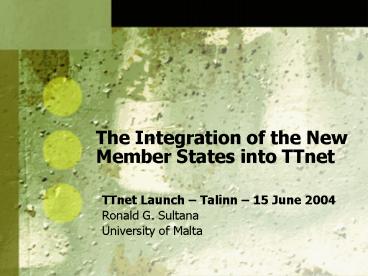The Integration of the New Member States into TTnet - PowerPoint PPT Presentation
1 / 12
Title:
The Integration of the New Member States into TTnet
Description:
Poor cross-sectoral collaboration. Corps is not professionalised ... Curricular/pedagogical - Competency-based - APL systems. VET initial & continued training ... – PowerPoint PPT presentation
Number of Views:20
Avg rating:3.0/5.0
Title: The Integration of the New Member States into TTnet
1
The Integration of the New Member States into
TTnet
- TTnet Launch Talinn 15 June 2004
- Ronald G. Sultana
- University of Malta
2
Key points
- The process of integrating new members
- Countries joining TTnet in 2004
- VET in NMS a synthesis
- VET teachers/trainers in NMS a profile
- Objectives for TTnet in the NMS
- Target groups and activities
- Collaboration with established TTnet
3
Process of integrating new members
- ETF survey on VET teachers and trainers of
trainers - Aalborg meeting (Nov 02) Danish presidency
- CEDEFOP Restricted Working Group
- Surveys among accession countries
- Country frameworks
- TTnet conference (Dec 03)
4
The NMS
APEL
Theory / practice
curriculum
standards
Classroom mgt
firm links
VET strategy
pedagogy
Career paths
use of ICTs
in-service
key concerns
Special needs
Training in industry
Profession-alisation
Qualifications framework
5
VET in NMS a synthesis
- A field marked by reform
- Post-1989 liberalisation Globalization forces
Accession - Several important initiatives
- - Legislative developments and measures
- - Social partnership model
- - LLL and CVT increasingly on agenda
- - Decentralisation and school autonomy
- - Linking education and enterprise
- - New VET curricula new assessment / cert
- - Introduction of competency-based models
- - Increased pedagogical training
- - A new qualification framework APL
- - Learning from good practice in EU
6
VET teachers and trainers a profile
- Ageing, unstable, poorly paid profession
- Majority of teachers are women
- Many teachers / trainers are not formally trained
- Pedagogical material and resources often outdated
- Teacher to student ratio falling academic drift
- Distinction between VET theory practice
teachers - Most universities do not offer VET teacher
training - Training often too theoretical
- Traditional teaching models
- Use of ICTs is limited
7
VET teachers and trainers a profile
- Insufficient ICTE training of VET teachers
trainers - Theory and practice de-linked
- Limited opportunities for traineeships in
industry - Poor cross-sectoral collaboration
- Corps is not professionalised
- National standards not yet formalised
- Limited firm-based training - issue of SMEs
- Lack of LM intelligence
- Adult educators often part-time
8
Key objectives for TTnet-NMS
Initial In-service TT
Innovation
Dialogue Network
Monitoring/Evaluation
Research
9
Key objectives for TTnet-NMS
- Communication networking
- - A national forum (seminars, workshops)
- - Link with industry
- - Improving image
- Innovation
- - Curricular/pedagogical
- - Competency-based
- - APL systems
- VET initial continued training
- - Theory/practice link
- - Mentoring
- Monitoring and Evaluation
- - Quality assurance
- - Teacher training
- Research
- - Trainers in firms
- - EU good practice
10
Target groups for TTnet-NMS
- VET administrators
- VET TT researchers
- VET teacher educators
- VET teachers and mentors
- LM trainers in public private training centres
- HRD departments
- Policy makers
- Social partners
11
Activities envisaged by TTnet-NMS
- Seminars, workshops, publications
- Mediating linkages
- Web-site, data base, register
- Local and EU-wide networking
- Research and evaluation
- Establishing competencies standards
- Identifying training needs
- Designing training courses
- Delivering training
- Developing tools (e.g. to measure VET teacher
competencies)
12
Collaboration with other TTnets
- Bilateral links
- Multilateral links
- Development of e-learning as a tool
- NMS TTnet collaboration
- Innovative pedagogic practices
- Validation of non-formal learning
- Quality assurance frameworks































